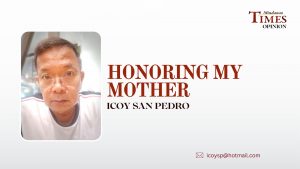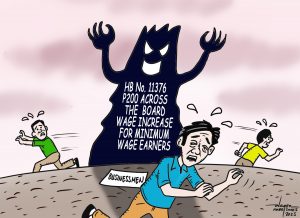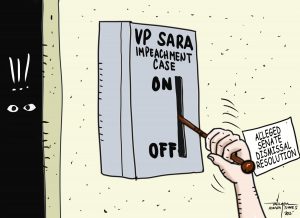The recently concluded midterm elections made me think of the importance of trust in a democratic society. Reports of “over-voting” by the millions and suspicions about the new system used in counting and transmitting votes are definitely major trust issues. Add to that is the observed significant difference between what the survey said and what election results showed.
Even though there were surprisingly hopeful outcomes, we still could not bring ourselves to fully trust the entire process. Yes, we have trust issues when it comes to our social institutions.
The 2024 Philippine Trust Index report conducted by the EON Group showed that, for Filipinos, “trust is not built on promises but on proof.”
“We are witnessing an Accountability Revolution, where Filipinos expect institutions to act with integrity and deliver results,” noted EON Group co-founder and chair Junie del Mundo.
Thinking of trust in this context made me reflect on what Francis Fukuyama, one of America’s leading academics and authors, said about trust as a foundational pillar for both democratic stability and economic prosperity.
Essentially, Fukuyama said that trust — both interpersonal (“horizontal”) and institutional (“vertical”) — is critical for functional democracies and thriving economies. He argued that high-trust societies foster cooperation through informal norms, enabling flexible business practices and civic engagement, which strengthen democratic participation. On the other hand, low-trust societies rely heavily on family ties or legal enforcement, which stifle innovation and social cohesion.
Using Fukuyama’s framework, it seems that the Philippines tend to be on the “low-trust” side at present. Our current political system can be described as having “weak institutional capacity with persistent problems of political legitimacy.”
With weak enforcement of laws, corruption, and bureaucratic inefficiencies, political power in the Philippines tends to be highly personalized, promoting patronage politics. Political leaders often derive legitimacy from charismatic authority rather than institutionalized processes.
Although we have regular elections, our democratic processes are often undermined by corruption, political dynasties, and weak rule of law.
We have a deficit of what sociologist James Coleman has called “social capital” — the ability of people to work together for common purposes in groups and organizations. Coleman said that in addition to skills and knowledge, “a distinct portion of human capital has to do with people’s ability to associate with each other, that is not only critical to economic life, but to virtually every other aspect of social existence as well.”
That ability to associate with others depends, in turn, on the degree to which communities share norms and values and “are able to subordinate individual interests to those of larger groups.”
Social capital, Fukuyama noted, is rooted in cultural mechanisms like religion, tradition, and historical habits. It transcends individual relationships and is embodied in groups ranging from families to nations.
These shared values, like honesty and cooperation, cannot be easily engineered by policy or legislation. Yes, unfortunately, we cannot legislate “good moral values.” These values are cultivated and nurtured over time, developed organically.
Out of such shared values comes trust. And trust enables collective action without relying solely on contracts or legal enforcement.
If this trust is narrowly confined to family or close circles, this breeds corruption as public officials may prioritize kinship over public good. We have a lot of examples of this close to home. We do not have to go far than our own barangays to observe this.
Fortunately, we do have a vibrant civil society in the Philippines that can act as mediators that facilitate dialogue, participation, and accountability. However, our community organizations (NGOs, civic organizations, church groups, etc.) often operate in silos and echo chambers.
So what we have now is a society with strong familial bonds coexisting with fragmented civic engagement.
Since we cannot rely on our politicians in government to take the lead in developing our social capital to build trust, our hope lies in civil society.
Fukuyama highlights Alexis de Tocqueville’s idea of the “art of association” as vital for democracy. It is the concept that democracy thrives when citizens actively participate in voluntary groups. These voluntary groups (labor unions, service clubs, charities, cooperatives, grassroots organizations) act as “schools of citizenship” that teach cooperation and counter excessive individualism. They serve as training grounds for democratic values.
Civil society is the bridge between individual citizens and formal institutions. Unlike hierarchical institutions with “vertical trust” in authority figures (like government), civil society fosters “horizontal trust” among equals. Forging connections between strangers or diverse groups through interfaith dialogues and multicultural festivals, for example, foster generalized trust that enables collaboration across religious, ethnic, or class divides.
Organizing through professional associations (chambers of commerce or medical societies) and advocacy groups (peace, environment, consumer protection) also create shared identities beyond kinship or locality.
When civil society organizations collaborate with government in creating policies and programs, they help legitimize institutions and inspire trust from the people. Davao City’s success has been pretty much because of this collaboration.
In the same 2024 EON trust survey, it revealed that Filipinos trust their local government unit (LGU) more than the national government. That is reflected in the results of the 2025 midterm elections, especially here in Davao City.
I think the overwhelming mandate given by Davaoeños to Mayor Rodrigo R. Duterte is not just a “protest vote” against the national government, it is also an affirmation of how the city government, under his leadership, encouraged civil society’s active participation in local governance and, in the process, built trust.
Historically, Davao City’s development has always been private sector-driven and civil society-led. Mayor Rody understood that very well so most of his accomplishments were achieved by nurturing that social capital.
I believe, even when he’s not here, Davao City will go on to achieve great things. Our acting mayor only has to tap on that social capital to unleash the Davaoeño spirit of cooperation and innovation. Mayor Rody’s children and grandchildren need to earn and nurture that trust. They also need to show Davaoeños, in their words and actions, that they also trust us to lead and govern alongside them. ###




